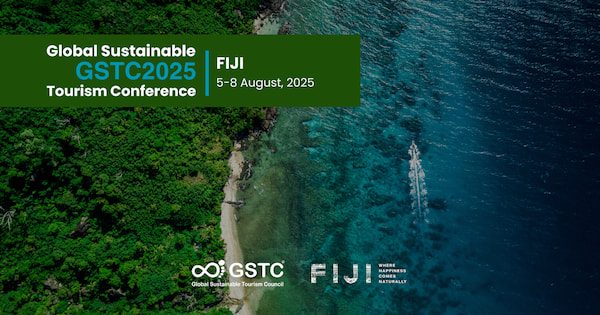Fiji is set to host the Global Sustainable Tourism Conference (GSTC2025) from August 5 to 8, 2025, at the Sheraton Fiji Golf & Beach Resort. This landmark gathering is expected to play a vital role in reshaping the future of global travel, focusing on innovation and essential policy shifts required to build a more responsible and resilient tourism industry.
Organized by the Global Sustainable Tourism Council (GSTC), the conference will bring together a distinguished mix of global leaders, including government officials, destination managers, tourism professionals, and sustainability advocates. Fiji’s selection as the host nation highlights the growing importance of sustainable tourism in the Asia-Pacific region. The island nation has been recognized for its strong commitment to responsible tourism and active community participation, both central elements of its national tourism agenda.
The conference will revolve around key themes that address the most pressing challenges and opportunities in sustainable travel today. Coastal and island tourism will be a major focus, with discussions centered on the unique environmental pressures faced by these regions and the innovative solutions needed to protect their ecosystems. Another core theme will emphasize the role of communities and cultures in tourism development, ensuring that growth is inclusive, respectful, and beneficial to local populations. In light of growing climate concerns, there will also be in-depth dialogue on building climate resilience, adaptation, and strategies for sustainable recovery across the tourism sector.
GSTC2025 is expected to serve as a platform for introducing and debating innovations that can revolutionize the travel industry. From sustainable hotel design and waste reduction initiatives to breakthroughs in clean aviation technology, the conference will spotlight a range of forward-thinking practices. Airlines and airports will play a significant role in conversations about lowering the carbon footprint of air travel, as stricter emission regulations become a global priority. Hotels will also showcase green strategies, such as organic farm-to-table dining and programs that engage and uplift surrounding communities. Fiji’s own eco-tourism efforts will be held up as examples of how local values and sustainability can be successfully integrated.
A major highlight will be the emphasis on community-led tourism models that place local voices at the center of planning and operations. Fiji’s National Sustainable Tourism Framework (NSTF) 2024–2034, built on indigenous principles such as veilomani (compassion) and veisolisoli (sharing), reflects this vision by prioritizing tourism that is culturally anchored and community-driven. Technology will also play a role, with data-driven tools like AI-powered SnapSight being explored for their ability to track and measure sustainability impacts more effectively.
Among the standout initiatives to be discussed is Fiji’s “Loloma Hour,” a nationwide program inviting tourists to dedicate an hour of their visit to hands-on sustainability projects such as coral planting and mangrove restoration. This initiative symbolizes a significant policy shift toward participatory and purpose-driven tourism, where every visitor contributes meaningfully to the host destination.
Fiji’s deep-rooted commitment to sustainable tourism is evident in its broader development strategies. The nation’s upcoming National Development Plan (2025–2029) and Vision 2050 place tourism at the heart of efforts to foster economic resilience, social well-being, and environmental conservation. The National Sustainable Tourism Framework further strengthens this approach, aiming to grow tourism in ways that are inclusive, environmentally responsible, and deeply aligned with Fiji’s cultural identity.
The Global Sustainable Tourism Conference 2025 in Fiji is not just another international event—it represents a defining moment for the country’s tourism future and a global call for collective action. As the world searches for sustainable pathways to explore and connect, GSTC2025 offers a vision of travel that is thoughtful, equitable, and transformative.














